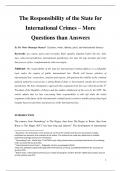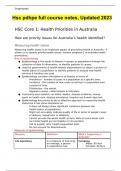The Responsibility of the State for
International Crimes – More
Questions than Answers
By Dr. Peter Onyango Onyoyo1 (Lecturer, writer, debater, jurist, and international lawyer)
Keywords: jus cogens, pacta sunt servanda, State equality, Equality before the law, Soft-
Law, universal jurisdiction, international jurisdiction, Lex lata, De lege ferenda, fair trial,
due process of law, complementarity and sovereignty.
Abstract: The responsibility of the state for international criminal offences is a debatable
topic under the regime of public international law. World well known scholars of
international law, researchers, analysts and experts, still question the viability of the criminal
judicial authority to prosecute a sitting Head of State or Government outside the territorial
jurisdiction. We have attempted to approach this argument from the case which faced the 4th
President of the Republic of Kenya and the sudden withdrawal of the case by the OTP. The
article admits that lex lata concerning State responsibility is still soft while the whole
argument of the future of the international criminal justice system is tenable giving deep legal
insights based on doctrines and practices of the international law.
INTRODUCTION
The journey from Nuremberg2 to The Hague, then from The Hague to Rome, then from
Rome to The Hague (ICC)3 has been long and arduous4. The development of international
1
Disclaimer- the sentiments in this article are not from the named university nor any private or public
institution but personal, free initiative of the author. The research has made key references to credible
authorities and legal sources for information.
Nu e e g T ials - Wo ld Wa II HISTORY.com) <http://www.history.com/topics/world-war-ii/nuremberg-
2
trials> accessed 24 January 2015.
I te atio al C i i al Cou t , , Wikipedia, the free encyclopedia (2015)
3
<http://en.wikipedia.org/w/index.php?title=International_Criminal_Court&oldid=643557145> accessed 22
January 2015.
‘o e t C e , I te atio al C i i al La s “tate “o e eig t : A othe ‘ou d? Eu opea Jou al
4
of International Law 979.
1
,criminal law has not been as smooth as one might think. State sovereignty has been at the
core position of debates by international legal thinkers on the development of international
criminal justice, its disillusions and prospects. The historical exploration of the same
contention triggers off more concern about the answer about how to deal with the so called
“international crimes” through the international rule of law and accountability of the States?
The achievements made by the United Nations sponsored tribunals, namely, Nuremberg
Trials in 1950s, International Criminal Tribunals of Yugoslavia (ICTY), Rwanda (ICTR), and
other Special UN Courts such as Sierra Leone, Cambodia, and the tribunal of Tokyo, all
paved the way for the development of the lex lata but may not provide sufficient ground for
the argument on the lex ferenda regarding global criminal justice for reasons that shall be
demonstrated.
The best remaining hope for the entrenchment of international criminal law as a
regular feature of the international system is the development of a deeply rooted
culture of accountability that leads to a convergence of perceived interests and of
behaviour on the part of the States responsible for enforcing this law. The ICC and
related developments may in fact contribute to the emergence of such a culture,
although present signals are not uniformly positive (at 3).5
Accountability of States in criminal offences has been the major point of contention within
the international community. However, still history has it that no any sovereign State, starting
from the Peace of Westphalia in 1648 that brought peace after long wars of religion in
Europe, will easily endorse a treaty that would subject them to criminal adjudication at
regional, international and universal levels.
The cosmopolitan ideology underneath the development of the international law is still in
force but with substantive resistance. The concept of humanity and its universal value has
been systematically incorporated among the key sources of the international criminal law and
its future development. Human rights law, humanitarian law (Geneva law), the Peace
Conferences of The Hague, and the United Nations law are the strategists towards
international criminal justice by all effect. 121 States have ratified the Rome Statute by 2014
shaping the global justice6 system7. Other states have only signed the Statute but have not
5
Ibid.
F édé i Még et, What “o t of Glo al Justi e Is I te atio al C i i al Justi e ?
6
Journal of
International Criminal Justice mqu080.
2
, ratified it, others have ratified the law but are still reluctant to adhere fully to its requirements
based on the stigma on international crimes.
BACKGROUND SURVEY
This research is inspired by the Prosecutor’s decision to withdraw the charges against
President Uhuru Muigai Kenyatta claiming the weakness of the evidence as the reason.
Charges of crimes against humanity were put on him before ascending into State power. The
Pre-Trial Chamber and the former Prosecutor Luis Moreno Ocampo were both convinced that
he had substantive criminal case to answer in the Court. On the 3rd of December 2014, the
Judges of Trial Chamber V (B) of the International Criminal Court (ICC) declined to further
adjourn the trial of Mr Uhuru Muigai Kenyatta compelling the OTP to make decision.
Statements from the Prosecutor read as follows:
Accordingly, given the state of the evidence in this case, I have no alternative but to
withdraw the charges against Mr. Kenyatta. Earlier today, I filed a notice to
withdraw charges against Mr. Kenyatta. I am doing so without prejudice to the
possibility of bringing a new case should additional evidence become available.
I have decided to withdraw the charges against Mr Kenyatta after carefully
considering all the evidence available to me at this time. I have based this decision
on the specific facts of this case, not on any other consideration. As Prosecutor, my
actions and decisions have always been guided by the law and the evidence.
Prior to this land-marking withdrawal of international criminal case involve a sitting
President, Chief Prosecutor Fatou Bensouda had raised serious concern on the failure of her
office to be accorded with full collaboration by the Kenyan Government especially
concerning key documents needed to support the case against the defendant. The Prosecution
and the team showed frustrations emanating from the Kenyan Government which convinced
the court to invite the Attorney General Prof. Githu Muigai to present himself to handle tough
question at The Hague. It was to challenge the court order to freeze the assets of the sitting
President and compelled the Government to serve the Prosecution with required critical bank
information.
Q&A: I te atio al C i i al Cou t BBC News) <http://www.bbc.co.uk/news/world-11809908> accessed 24
7
January 2015.
3






